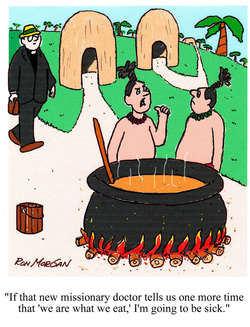 A missionary meets a cannibal, and it does not go well. He is eaten. But the cannibal is so impressed by the demeanor of the missionary as he awaits death, that he is converted. So how will these two be raised from the dead? Part of the missionary would have to be part of the cannibal! This was the gist of an atheist pamphlet that triumphantly concluded it had so ridiculed the notion of resurrection, and its logical knots and impossibilities, that no one could possibly continue to believe in it. A similar argument is being used by the Sadducees against Jesus in the Luke reading for this week. They are confident they have exposed the notion of resurrection for the stupidity which it is. The Sadducees were being snarky, for sure. They weren’t talking about their own deaths or the death of their loved ones. They were trying to trip Jesus up in the ridiculous nature of the scenario they spun. If a woman is married 7 times in this world, to whom will she belong in the next world when all the resurrected people get back together again? Jesus tells them they have completely missed the point. Yes, they have outlined the custom of Levirate marriage, which was a way of ensuring the continuance of the family line, even if they use an extreme example. To make sure his family line was continued if a man died, his brother provided an heir with the surviving wife. Jesus disputes nothing about the custom. But the Sadducees assume in their argument that resurrection life is of the same quality, or same order, as our present life. They expect people will marry, for example. Their argument depends on this. They are wrong, according to Jesus, because the life of the resurrection will be fundamentally different. "They neither marry, nor are given in marriage." So what is resurrection? We can see that there is a problem with treating it as being of the same qualitative order as this life; it makes no sense. Jesus also understood it as different to life now. "They neither marry, nor are given in marriage … they do not die because they are angels and children of God, being children of resurrection." Resurrection is about a new kind of life in every respect. Although Jesus is answering the Sadducees, he is also addressing everyone within earshot, and some of them have very real concerns about the nature of resurrection. What will it be like after we die? Levirate marriage, as the Sadducees were describing, existed for the purpose of ensuring children to men in the patrilineal system. If we give the benefit of a doubt, we could consider that levirate marriage protected women by giving them a household to belong to when their husbands died. But if everyone is a child of God, then issues of lineage no longer apply. Everyone has a “name” in the family of God—they are children of the resurrection, not children of men. Even women have a household to belong to, the household of God, and they no longer need marriage to ensure that. Marriage is, of course, a huge issue in our contemporary society too. Who gets to marry whom, and what does it mean? The Sadducees asked their question based on the law, the books of Moses, and Jesus gave an answer rooted in the same text. They talked about women belonging to men, and Jesus talked about people belonging to God. Ultimately resurrection is about trust in the goodness of God. Resurrection reflects a thirst for justice, and a hope that God is just rather than arbitrary and unfair, or powerless. Resurrection is a trust in the love of God that includes us in a household that is more loving than any we experience on earth. And so we can persevere in this life, knowing that we belong to God and the relationship we have with the God of the living transcends even death.
1 Comment
|
Rev. Dr. Shannon SmytheUnited Presbyterian Church Archives
March 2023
Categories |
Address 12 Yardville-Hamilton Square Road, Yardville, NJ 08620 Phone 609-585-5770 Email [email protected]

 RSS Feed
RSS Feed